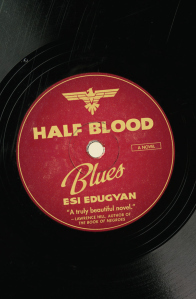
Title : Half Blood Blues
Author: Esi Edugyan
Genre: Fiction
She forgot the definition of “jazz” as well and came to think of it as every beautiful thing she had ever failed to appreciate: the taste of warm rain; the smell of a baby; the din of a swollen river, rushing past her tree and onward to infinity.
– David Sedaris, Squirrel Seeks Chipmunk: A Modest Bestiary
Half Blood Blues won the prestigious Scotiabank Giller prize in 2011 and received shortlist honours for both the 2011 Man Booker Prize and the 2012 Orange Prize for Fiction. These awards set the stage for high expectations from the book and the Afro-German story set in the World War II promised an extraordinary reading.
Summary
Half Blood Blues plays out in Nazi controlled Berlin and in occupied Paris before and during the Second World War. It follows the fortunes of a band of Afro American and an Afro German jazz players who continue to make music through the dread of the war and the debilitating personal feelings of failure and jealousy.
Half Blood Blues has a jagged tone like the blues and the story drips with pathos. The storyline and the characters are deeply emotional as all art and artists are understood to be. We encounter mixed race, wild music and plenty of verbal idiosyncracy.
The Story
The book begins with a lovely preface and is followed by an exciting setting. It mentions the legendary jazz musician, Hieronymous Falk or the Kid who disappears during the second world war. He is part of an Afro American jazz band which is trying to survive the Nazi persecution. The book then moves to America, fifty years on; it is suspected that the kid is alive and there is the promise of a meeting at the end of a journey, that his erstwhile band members Sidney Griffiths and Charles C. Jones undertake.
Review
Written as a first person narrative, Half Blood Blues is the voice of the old and the weary. And when the narrative turns back to the past, which seems more real than the present, Half Blood Blues is also the voice of the young and the energetic. The storyline flits between the now and the past. The now is in the early 1990s and the past was in 1939.
Somewhere along the middle of the book, repetition sets in. The pace goes slow and there are no sub plots to break the monotony. The narrator looks to be turning into an unreliable one. The descriptive scenes feel too long. There are hunches and feelings but nothing happens. The settings start to repeat themselves. The band members are stuck in a tiny place, hidden from the rest of the world too many times. The story moves forward in their minds and in the dirty, derelict studios and apartments they are forced to take refuge in.
Delilah Brown, the singer and a close associate of the influential Jazz musician, Louis Armstrong, is their saviour, of all those men cooped up and tortured by their own talent and by a longing to express their dream of fine music.
Delilah is the one holding the story together, pushing the action, making things happen, having contacts, having compassion, dispensing love and living with anger, stress and disappointment. And yet, everything about Delilah sounds unreal, from her sudden and unexplained appearances throughout tho book to her looks – slender, bird like, a turbaned head… toughness hidden behind a soft exterior.
As we read on and when the book is three fourths through, the excitement comes via the unreliable narrator. By this point, there are too many threads and too much unravelling. You don’t wonder how would the ball of yarn be rolled again… It would be, for sure, for the book does have an ending . It is just that the threads seem tangled. At times, there is too much back and forth just to get the story going. Half a century sometimes feels like worlds apart. The words sometimes seem to have been strung together only with wild dreams and with hope.
Along Rue Pigalle and Rue Fontaine only our own echoing footsteps kept time. We grown lean as greyhounds, our bodies all hope and bone.
The book follows the second world war. It follows the steps of the hallowed jazz musicians. It traces the passion of the artists. It is a story of those men who loved, found their passion, lost and saw suffering. In spite of the cramped, dark feel of the book, the jazz uplifts the soul and the story ends in the vastness of the Polish sky, in dereliction yet again, touching misery, suffering and the immutable hope and compassion. The ending of the book is redemptive of the motives of the players and of the narration that seems fractured and implausible in places.
There is doubt ; there is failure; there is loss. And there is also a reconciliation to these emotions.
Maybe I was just finally forgiving myself for it. For failing. Maybe that was the sound of forgiveness I heard in my old axe. Cause that night, swinging by candlelight in that cramped room, everything warring in me settled down.
Verdict
Half Blood Blues touches your soul, in a mess of wild joyous music surviving passionately the personal misery and the fear that the war brought.
I teamed up with Bloggeray to read and review the book at the same time. Do check out his excellent review here.
Advertisements Share this:





